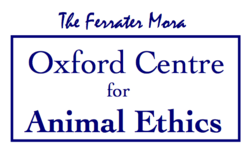Ferrater Mora Oxford Centre for Animal Ethics | |
 | |
| Named after | José Ferrater Mora |
|---|---|
| Formation | 2006 |
| Founder | Andrew Linzey |
| Purpose | Promotion of animal ethics |
| Location |
|
Director | Andrew Linzey |
Deputy Director | Clair Linzey |
| Website | www.oxfordanimalethics.com |
The Ferrater Mora Oxford Centre for Animal Ethics is an organisation based in Oxford which promotes animal ethics.